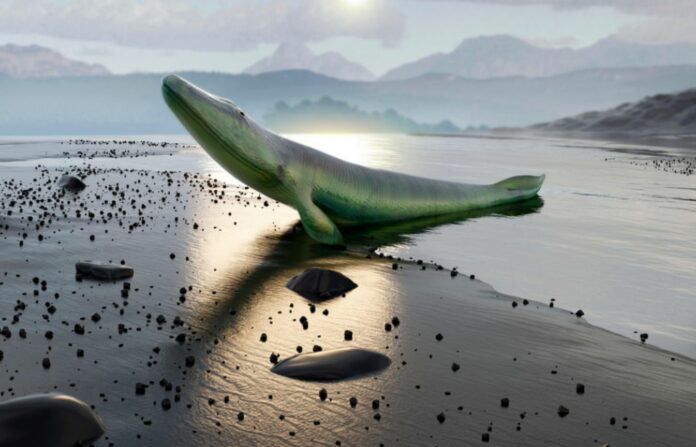A new study published today found that tetrapods’ evolution was restricted for millions of years as their skulls had fewer bones than both extinct and current fish.
Researchers from the University of Bristol, Barcelona’s Universitat Pompeu Fabra, and University College London looked at fossil skulls of animals that lived in both water and on land.
They found that tetrapods had more interconnections between their skull bones than fish.
And these modifications to the skull’s architecture actually hindered the evolution of tetrapod skulls rather than encouraging the variety of life on land.
Tetrapods, the ancestors of everything from frogs to humans, emerged from fish as the first land animals with limbs and fingers.
In order to learn more about how skulls changed as tetrapods evolved, the study, which was published in Science Advances, quantified the arrangement of skull bones in over 100 extant and extinct creatures.
“Tetrapod skulls generally have fewer skull bones than their fish ancestors,” says Lead author James Rawson, “but simply counting the number of bones misses some important data.
So they “used a technique called network analysis, where the arrangement of skull bones – which bones connect to which – is recorded in addition to bone number.”
Expert in this method and author Dr. Borja Esteve-Altava said: “Traditionally, anatomy research has been mostly descriptive or qualitative,” adds author Dr. Borja Esteve-Altava
Anatomical relationships between bones, according to the author, can be quantified using network analysis, a method that is frequently ignored in research on morphological evolution.
The authors discovered that because tetrapods have fewer skull bones than fish, their skulls are more tightly organized.
“It might seem strange, add Mr. Rawson, but having fewer bones forces each bone to link with more of its neighbors, creating a more intricate arrangement. Of all the creatures they examined, modern frogs and salamanders had the most complicated skulls. The skulls of the first tetrapods also started to become more like a single unit, while the skulls of their fish ancestors were made of several separate parts.
By looking at the different ways skull bones have been arranged over time, the authors also found that the beginning of tetrapods coincides with a drop in the number of different ways skull bones can be arranged.
“We were surprised to find these changes to the skull,” explains senior author Emily Rayfield, “seemed to limit tetrapod evolution, rather than promoting radiation to new habitats on land.”
They “think that the evolution of a neck, extinction events or a bottleneck in skull development may be responsible.”
“We also see a similar drop in structural variability for the limb bones in early tetrapods,” adds Mr. Rawson, “but the drop in the limbs happens 10 million years earlier.
“It seems that different factors were affecting skull and limb evolution in early tetrapods, and we have so much more to learn about this crucial time in our own evolutionary history.”
Image Credit: Getty
You were reading: “It Might Seem Strange”: Changes In Skulls Actually Restricted Evolution Of Tetrapods
